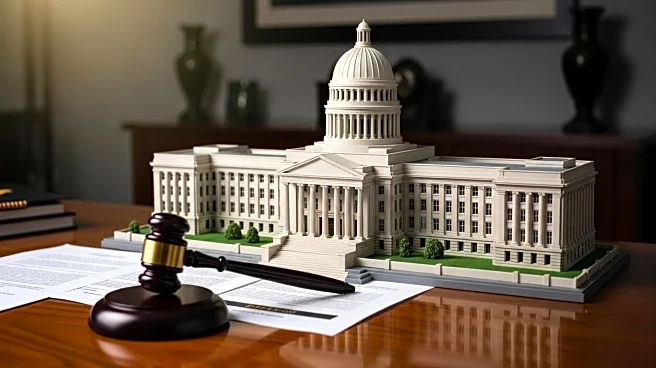What's Happening?
President Trump has announced plans to significantly reduce the size and scope of federal programs and agencies during the ongoing government shutdown. This initiative aims to streamline the federal bureaucracy and increase its responsiveness to presidential directives. The proposal includes shrinking various federal entities and making them more accountable to executive control. This move comes as the government faces a partial shutdown, with the Capitol Building in Washington, DC, serving as a backdrop to these developments. The shutdown is scheduled to begin on September 30, 2025, and is expected to impact numerous government operations and services.
Why It's Important?
The proposed restructuring by President Trump could have far-reaching implications for U.S. governance and public administration. By reducing the size of federal programs, the administration seeks to enhance efficiency and reduce government spending. However, this approach may lead to significant changes in how federal services are delivered, potentially affecting millions of Americans who rely on these programs. The shift towards a more centralized executive control could also alter the balance of power between the presidency and other branches of government, raising concerns about the concentration of authority and its impact on democratic processes.
What's Next?
As the government shutdown progresses, stakeholders including lawmakers, federal employees, and the public will likely respond to President Trump's proposals. Debates over the merits and drawbacks of shrinking federal programs are expected to intensify, with potential legislative actions to address or counter these changes. The administration may face legal challenges and public opposition, particularly from those who view the restructuring as a threat to essential services and democratic governance. The outcome of these discussions will shape the future of federal operations and the role of the presidency in U.S. government.
Beyond the Headlines
The restructuring initiative raises ethical and legal questions about the scope of presidential power and the accountability of federal agencies. Critics may argue that such changes could undermine the checks and balances designed to prevent executive overreach. Additionally, the long-term impact on public trust in government institutions and the effectiveness of federal services will be closely scrutinized. The cultural shift towards a more centralized government could redefine the relationship between citizens and the state, influencing public perceptions of governance and civic engagement.











